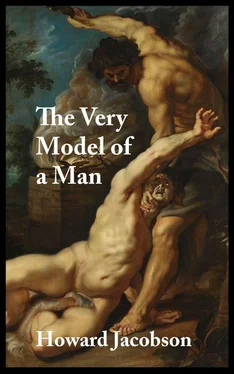To this end He painted the sky with colours that made my mother ache to set free her soul from its vegetable clothing. He played her heavenly music — divine melodies — which reminded her of where she had never been and woke her to anticipations of where she would never go. He whispered pastoral poetry in her ear, transforming her familiar mundane geography into enamell’d ground, watering her irriguous valley with fuming rills, protecting her complexion ’neath blissful bowers or in the shelter of umbrageous grots. He beguiled her into a pathetic fallacy, perpetuating the delusion in her that at His bidding the whole of nature would bend to her every feminine want, reverse the seasons rather than let her shiver, dapple her in sunlit gaiety before she should so much as think of letting go a sigh of sadness. ‘Where-e’er you walk,’ He sang, ‘cool gales shall fan the Glade. Trees where you sit,’ He promised, ‘shall crowd into a Shade.’ When had my father ever given her guarantees of that kind? Or last lisped the sweets of devotion as insubstantial as air –
I did but see her passing by,
And yet I love her till I die.
Everything that is mawkish in art, in other words, the All Trembling loosed upon the world in pursuance — in pursuance of the principle of the futility of pursuance — of my mother.
And she?
Well, naturally she had always been weak before the power of art. What woman is not? Which of them is proof against a little culture laced with compliment? A song, a dance, a pretty turn of wit, for which she might conceivably be credited with the inspiration?
It was my mother who had encouraged me, in the face of my father’s obdurate tonguelessness… dysphonia… muteness… recalcitrance… obmutescence… to coin words.
If I by chance stumbled on a rhyme in conversation — I am talking about my golden age now, my piping time, my fabled years before my Abel’d years — she showered praises on me, calling me her wonder boy, her prodigy, her little demi-god of language, all the while planting kisses on my head, as though to cool the forge that was my brain.
When I drew pictures in the soil she cried out in amazement at their lifelikeness, sometimes frightening my father who came running, fearing she’d been savaged by wild animals, and who was then asked to erect a fence around my work to keep those same wild animals from defacing it with their art-hating hoofs. As for my singing… there were times when I worried for her health, so direct a path did my trilling voice find into her heart, so violently did she roll her head to keep time with me.
Slim chance she had, then, against Someone who had put in more millennia daubing skies and harmonising spheres than her little demi-god had given minutes to scratching sandscapes with a pointed stick. Her capitulation, when it was demanded, was all but complete. She made mawkish art herself — made mawkish art of herself — sitting like a virgin with a baby at her breast and her eyes cast heavenwards, averted from the source of generation, modest, impregnable, fixed upon idea, not matter.
And yet there were moments, as I hung hidden in my tree, when I could have sworn those eyes drooped heavily again towards my muddy brother, and the old look of insentience in slime once more took possession of her features. I cannot say for certain there was a struggle going on. As a supporter of neither side I wasn’t on the look-out for signs of swerving loyalties. But it might have ended in a tussle had another god decided to try his luck in a more personable form. Who knows whether a snorting bull, making no bones about his intentions, may not after all have won the day, so many traces of the cow-in-heat did my mother still retain, so much steam still rose from her humid flanks, so full were her udders, even though Abel was fast approaching his first birthday, and divine melodies filled the air.
But there was no bull preparing to make a charge, and no notice served that any other god was willing to take up the challenge.
Unless you count my father, secretly perfecting his magic.
Leaving aside all the bodily disadvantages — cramps, stiffness, muscular spasms and seizures of the joints — it is not a good idea to spend as much time in a tree, spying on your family, as I did.
It is not a good idea emotionally.
You start to see your own absence, to notice how little your not being there is remarked on, how well others not only get by without you, but actually appear to thrive on your inexistence. To say that it is like observing your own death is altogether too grandiose. And too pleasing to yourself. You must suppose that you would in some measure be the hero of your own death, the reason why of whatever obsequies, and that at the very least you would be acknowledged sometimes as having been. What I saw, through leaves and fronds whose first function and principle of growth was to close around me, whose every breath seemed like a threat to mine, was more like my… cancellation. I was lodged in no memory because I had been expunged from the almanac. Eclipsed. Occulted. The consoling illusion that however blurred you become to yourself, you enjoy a clear outline in the minds and affections of those who love you — the child’s delirious supposition that at every waking moment a phantom of himself haunts the consciousness of his parents — came away in my aching fingers like stripped bark. I did not exist as an abstraction outside myself; I was not served and perpetuated by an army of impersonating spectres. If I had being anywhere, I had it in the tree; but, as my days in the tree were a sort of suspense of animation, I was as good as gone.
This condition is known to all, but not exclusively to all, who embark on espionage of the feelings. It is also the experience of the envious. For what else makes envy the most excruciating of the passions if not the dread of discovering your utter redundancy to the world’s business? If the envious man could be made to believe that those whose good fortune he covets, those whose successful instrumentality he lusts after, actually think about him sometimes, take him into their consideration, out of love or hate, for a minute or two each day, for a day or two each year, and in this way intertwine him with their happiness or their riches, above all with their operativeness, he would instantly lose his envy. It is not their well-being that he cannot tolerate, but his unnecessity to it; not their prosperity, but whatever shows prosperity itself prospering excellently without him.
I see a Babel-suspiciousness on your faces. You find me too sophistical in this matter? You would have a spade called a spade and greed and grudging given their proper names? Your prerogative. Your city. But you will not understand the metaphysics of envy, you will not even understand why anyone should envy you, so long as you suppose that mere thwarted materialism is the goad that pricks the envious.
When God smelled the smoke of Abel’s sacrifice, spread wide His nostrils to accommodate every pungent wisp and curl of it, do you think I fretted over the bounty He was sure to extend my brother in return? Do you think there were any cubits of inhospitable crawling scrub or homers of rotting straw to be handed over, that I could not bear to be without? There was nothing I wanted. Nothing I begrudged my poor obedient industrious younger brother. My feet slipped on the turning earth, failed to hold their ground against a force which seemed to blow me about the universe impalpably, like spores from a puff-ball — my ears roared, my skull collapsed inwards — not because I was greedy but because I was slighted.
Sleighted.
Palmed clean out of consideration and contention. Made superfluous in proportion as Abel was made to feel favoured, made supererogatory precisely to that favouritism.
Читать дальше











